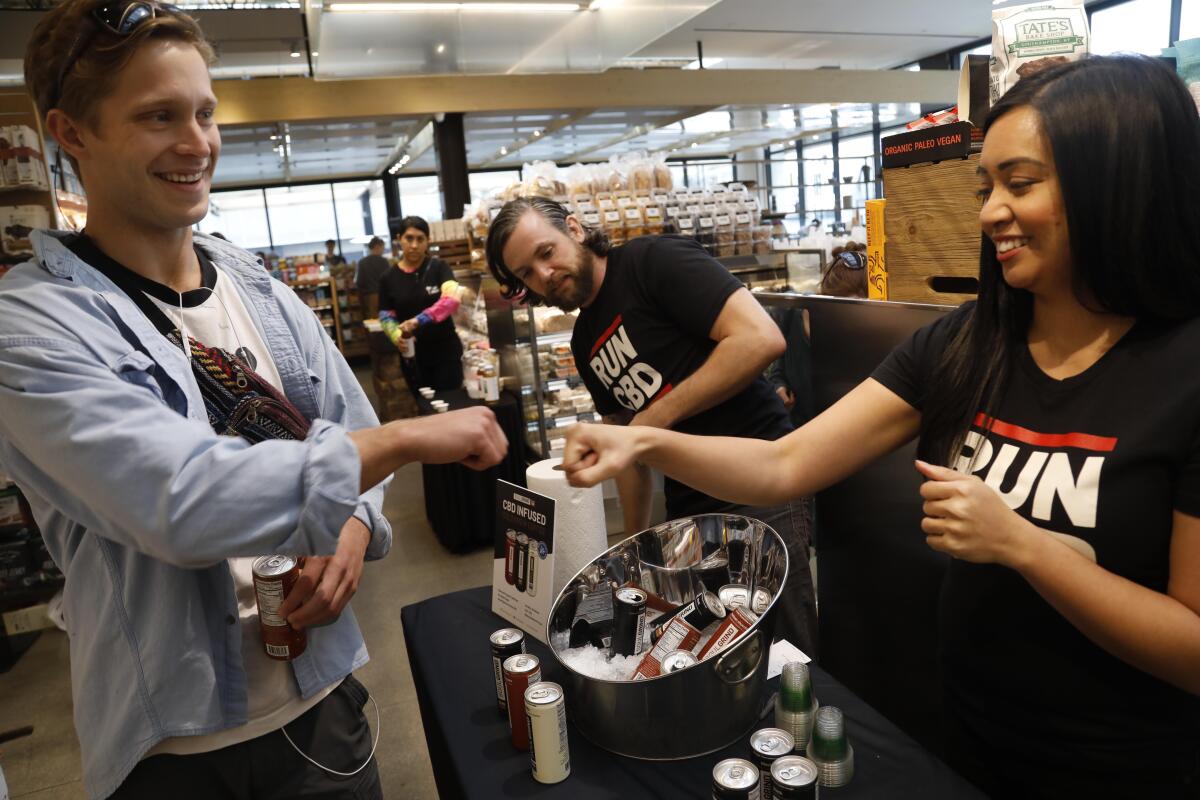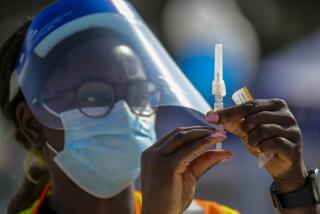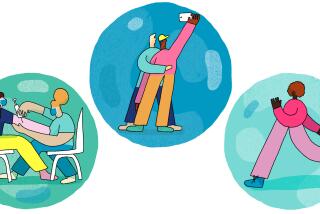The handshake deal is being tested by coronavirus

In sales, reaching a deal is supposed to be the tricky part — not the handshake at the end.
Douglas Jones, head of global sales and marketing for BioCell Technology in Irvine, must now be prepared for many possibilities. No flinching, for example, when a fist or elbow comes his way.
In the time of the coronavirus, the most staid of business traditions — the handshake — is taking new forms.
“You kind of need to assess the situation that you’re in, where you are and who you are with,” said Jones, whose company manufactures ingredients used in dietary supplements, foods and cosmetics. “This time, we might have to do the fist bump, maybe the elbow bump. It could be the foot bump. You swing your leg across the left to the right and you just touch shoes. I kind of wait and see. You need to read the body language.”
The coronavirus outbreak is bringing wide-ranging change to U.S. businesses. Corporate travel is slowing; employees are turning to telecommuting; conferences and trade shows are on hold.
Yet some business is still being conducted face to face, especially sales, the biggest category of jobs in America when including retail sales, according to the U.S. Bureau of Labor Statistics.
Here, the changes are procedural and cultural rather than technological.
Aware of the rising health concerns of their sales forces, businesses are responding with elaborate guidelines for personal contact and sanitation to help put workers at ease.
Some sales teams have even been told that they can refuse to shake hands — breaking from a custom so ingrained in the culture of commerce it dates from the classical Greek era, when dexiosis, the grasping of right hands, represented trust between two parties.
For his own peace of mind, a salesman unveiling a new cannabis beverage at Erewhon markets in Southern California on March 6 came up with a plan in advance.
“I’m just going to respectfully decline” any requests for a handshake, Devin Cardoza said as he and a colleague positioned cans and small cups on a table at Erewhon’s market on Wilshire Boulevard in Santa Monica. They were preparing to offer free samples of Soul Grind, a new CBD-infused cold brew coffee drink made by Caliva, a San Jose maker of cannabis products.
“We’ve got our hand sanitizer at the table. We’re keeping things clean,” he said. “However, we will still avoid shaking hands out of respect for the situation.”
With major trade shows canceled and states recommending against gatherings of more than 250 people, some of the highest-risk settings are now off limits for salespeople. That is forcing them to focus on remote sales — an art of its own — and face-to-face meetings in smaller settings.
Chris Cuvelier, head of beverages for Caliva, had planned to unveil Soul Grind at the Natural Products Expo West in Anaheim, but it was canceled after many vendors pulled out. After bringing 2,000 cans of the beverage and renting a house in Newport Beach for the big launch, Cuvelier worked out a deal with Erewhon to do the launch in its markets.
“Had it been Expo West, it’s business, so you really kind of have to shake hands,” Cuvelier said. “That’s very different than being in a market. When you’re talking to consumers, you don’t walk up and shake anyone’s hand who comes up. Right?”
Such precautions are wise, public health experts said.
“Hands are a very important vector for disease, and handshakes are a terrible idea from an infectious disease standpoint,” said Dr. Mark S. Sklansky, chief of pediatric cardiology at the UCLA medical school and medical director of the UCLA Children’s Heart Center.
Travel is central to many sales jobs, and it too has been especially hard-hit by the new coronavirus.
Cassandra Shuck, 32, a Los Angeles native now living in Charlotte, N.C., who owns Tola Marketing + Creative, estimates 90% of her firm’s sales stem from speaking engagements and public events.
“I sell my business from stage,” she said.
Before the outbreak, Shuck had planned a whirlwind 16 weeks of cross-country business travel, hoping to be finished with her 2020 work trips by Memorial Day. She has decided to muddle through, despite flight cancellations and event postponements.
“We’re continuing on with what we were going to do,” Shuck said. “But honestly, if it continues to spread, we’ll probably cancel some of them, but we can’t cancel all of them.”
Shuck said she has made changes to protect her health. “I have Clorox wipes,” she said. “I’m actually driving down to Florida instead of flying” to avoid the possibility of sitting on a plane with someone who has the virus.
Even as companies scramble to adapt to a pandemic, some remain adamant about doing business the traditional way: in person and with a handshake. That’s how President Trump thanked leaders of industry who gathered at the White House Friday as he declared the coronavirus outbreak a national emergency.
Cynthia Thurlow, 48, is a health and nutrition professional who travels regularly as a guest expert. A recent junket saw her flying from Washington, D.C., to Seattle, then on to Portland, Ore., before flying back east to Atlanta and then finally home again to Washington.
Shaking hands, she said, is just part of the deal.
“Obviously, if someone were hacking and coughing and clearly looked ill, then I would not be shaking their hands,” said Thurlow, who owns CHT Wellness and earned undergraduate and graduate degrees in nursing from Johns Hopkins University. “But the rest of the population, I feel very comfortable continuing to interact the way that I would normally.
“I do think that that’s still normal business interaction. That’s an expectation.”
More to Read
Inside the business of entertainment
The Wide Shot brings you news, analysis and insights on everything from streaming wars to production — and what it all means for the future.
You may occasionally receive promotional content from the Los Angeles Times.











